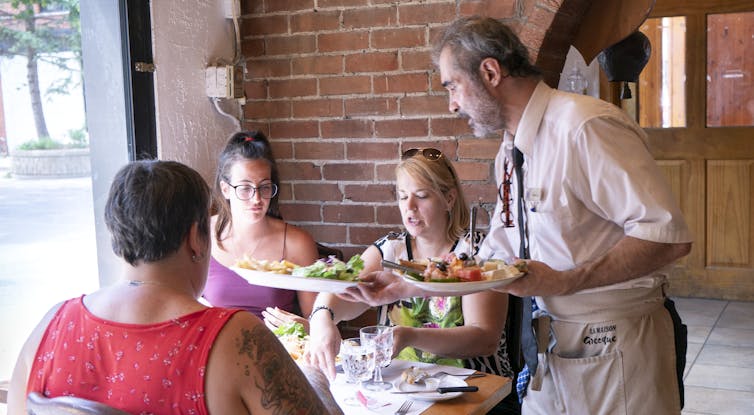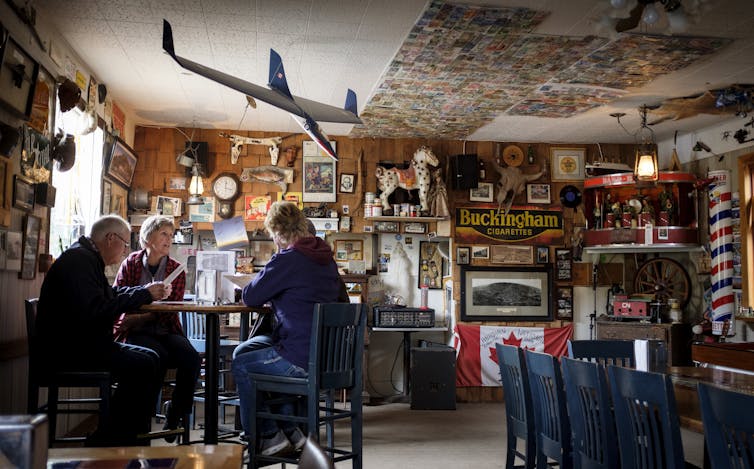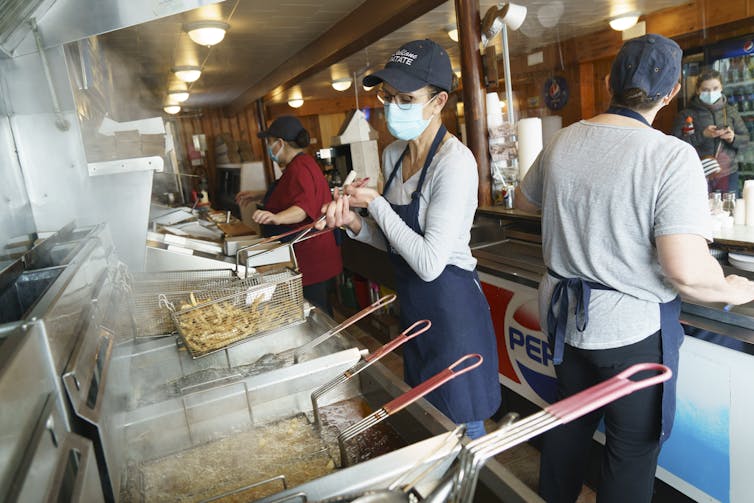
Canada is stuck with tipping — and we’re worse off for it
Tipping isn’t going to disappear anytime soon, but provinces can do more to protect servers.
By Marc MentzerImagine a local business where employees are compensated by age, gender, attractiveness and with some extra dollars if they flirt with customers. It would end up before the human rights commission and lead the local newscasts.
Yet this is how tipping works. It’s a deeply embedded custom and an unquestioned part of everyday life. But as the average tip percentage goes up in Canadian restaurants, tipping is coming under more scrutiny.
When the COVID-19 pandemic began, there was a belief that the crisis would be such a shock to the status quo of the hospitality industry that tipping as a custom might collapse. As we’ve seen, the opposite has occurred.
There are two frequently given defences for tipping, neither of which hold up under close scrutiny.
Rewarding good servers?
Tipping rewards good service, right? This belief presumes that the server receives the tip. But in most provinces, management often requires servers to share tips with kitchen staff, and sometimes with management itself.
Furthermore, Canadian provinces and territories permit tip-sharing among servers. Your individual hard-working server may not have any appreciable benefit from your generous tip.
In the United States, where research on tipping has been more extensive, it’s been found that there is no meaningful connection between the amount of the tip and the quality of service.

Lending a helping hand?
The other common defence of tipping is that these poorly paid employees need some extra help. Yet we’re not selective about which poorly paid employees we tip.
We don’t tip retail workers or maintenance workers, who are also usually working for minimum wage. Each culture has different customs about which occupations get tipped, and it’s hard to find any consistent rationale.
In the United States, Prohibition in the 1920s and early 1930s was an existential shock to the restaurant industry. When alcohol sales became illegal, restaurateurs welcomed tipping because it eased some of the financial pressure for employers. As a result, Prohibition caused tipping to become routine in the U.S. and the custom eventually spread to Canada.

The pandemic’s impact on tipping
The latest existential threat to the industry, the COVID-19 pandemic, likewise has made tipping even more deeply entrenched.
Some Canadian and American restaurants have experimented with abolishing tipping, and the record has been mixed. Servers like tipping because they feel they can control their income, and customers like tipping because it gives the illusion of power over the servers.
Some restaurants abolished tipping, but reinstated it due to pressure from servers and customers. Those few establishments that have succeeded with a no-tip model tend to be high-end, fine dining establishments where the clientele is insensitive to price.
A variation of the no-tipping concept is service charges for customers instead of a tip. But where service charges are in place, the money doesn’t always go to the servers. In many instances, the restaurant manager simply keeps some or all of the service charge, so it’s merely a sneaky way of increasing menu prices.

Is paying fair wages up to the customer?
In a rational world, servers’ compensation would not come via tips. In nearly all occupations, it’s the employer’s obligation to pay a reasonable wage, not the customer’s duty to bring compensation up to a fair level.
Yet abolishing tipping is hopelessly idealistic. A more modest and realistic tack is to revisit provincial laws on what actually happens to the tip money after the customer leaves.
The sharing of tips with non-tipped employees is known as “tipping out.” In most provinces, tipping out is such a long-running custom that it’s rarely questioned. After all, who can begrudge a few dollars going to the under-appreciated kitchen staff, who don’t get tipped?
The opposing perspective is that paying the kitchen staff is management’s responsibility. In short, it should not fall on the shoulders of the tipped employees to ensure that other employees are fairly paid.
As well, the “tipping out” percentage is increasing, as servers are required to share an ever-growing proportion of their tips with kitchen workers. This further dilutes the notion that a tip is the customer’s reward to a specific server.

Provinces handle tipping differently
Québec, along with Newfoundland and Labrador, forbid tipping out. Other provinces might consider following suit.
Even more objectionable is the practice of “house tipping,” where management takes a share of the tips, often sugar-coated with language about everyone being part of the team.
Legal protections for servers vary by province. Broadly speaking, Québec gives restaurant servers the highest level of protection where tips are concerned, while Alberta, Saskatchewan, Manitoba and the three northern territories give restaurant owners almost unlimited leeway in how tips are handled.
Restaurateurs would, understandably, fight any reforms that restrict their handling of tips, because kitchen workers would expect employers to make up the lost income if “tipping out” was abolished.
Despite industry opposition, this would be a small step in softening the dysfunctional but deeply ingrained tradition of tipping. The notion of actually abolishing tipping is a dream for another day.![]()
Marc S. Mentzer, Professor of Human Resources and Organizational Behaviour, University of Saskatchewan
This article is republished from The Conversation under a Creative Commons license. Read the original article.

